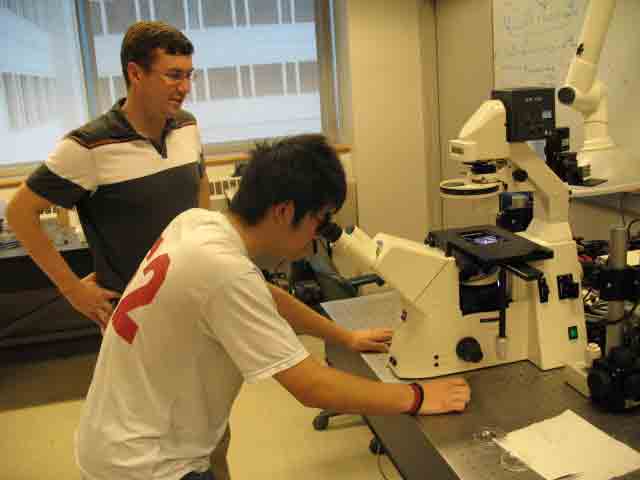Polymer Scientist Says Creativity Is Key

Editor's Note: ScienceLives is an occasional series that puts scientists under the microscope to find out what makes them tick. The series is a cooperation between the National Science Foundation and LiveScience.
Name: Ryan Hayward Age: 31 Institution: University of Massachusetts, Amherst Field of Study: Polymers, Nanomaterials
Polymers are the name of the game for Ryan Hayward, assistant professor of polymer science and engineering at the University of Massachusetts, Amherst. Made up of smaller molecular components called monomers, polymers are chain molecules found in a wide variety of substances such as DNA, plastics, bread, diamonds, glass and most recognizably, in plastics. Hayward and his research group are currently studying active polymer interfaces and self-assembly of polymers and hope to apply their discoveries to solar energy and biomedical applications. Hayward, who recently received the 3M Non-tenured Faculty Award, which recognizes new faculty and provides financial support for their research, worked with collaborators on a study featured in a special June issue of Soft Matter, a peer-reviewed scientific journal. Learn more about Hayward and his work at his website, and below as he answers the ScienceLives 10 Questions.
What inspired you to choose this field of study? When I was a senior in college I had the chance to do an independent research project with Professors Ilhan Aksay and Dudley Saville, which was a lot of fun. We were studying how colloids-very small solid particles-can spontaneously self-assemble into regular structures, and how we could influence this assembly with electric fields and patterns of light. Going into lab was always the best part of the week because I could basically play around with things that had always fascinated me. At some point I realized: "wow, I could actually do this as a career and get paid for it." What is the best piece of advice you ever received? I'd have to say it's something I've always heard from my parents and mentors: that you have to pursue what you love to do. Life is short, so make sure you enjoy what you are doing. What was your first scientific experiment as a child? I think in some ways I've always been more of an engineer than a scientist - more of a tinkerer. I remember spending hours in the basement trying to build essentially Rube Goldberg devices, where a ball would roll down a pipe, bounce off a table, and knock something over, and so on. I also spent a lot of time taking things like toys apart to try to understand how they worked. Unfortunately, I wasn't usually quite as good at putting them back together. What is your favorite thing about being a scientist or researcher? My favorite thing is that you really have the freedom to define what you want to do. You can essentially make up any question you like, and as long as you can convince other people that it's interesting enough to merit funding the research and publishing the results, you can spend your time thinking about whatever problem gets you most excited. What is the most important characteristic a scientist must demonstrate in order to be an effective scientist? I guess there is no universal answer, but in my experience it's important to be good at solving problems and to be persistent. The challenge is usually not figuring out what the interesting questions are; usually the hard part is figuring out how to answer them. Most of the time the first way you try to tackle a problem won't work, so it's important that you don't give up, but instead that you keep trying different angles to solve the problem. I think it's also important to be able to keep an open mind. Very often you'll find an interesting result that takes you in a completely different direction than you initially intended. You can't stay too focused on what you expected to see; otherwise you'll miss a lot of interesting things. What are the societal benefits of your research? I hope that the work we're doing will result in new sorts of materials and devices that can be used in biomedical applications. We're also working towards potential applications in renewable energy, particularly solar energy. Who has had the most influence on your thinking as a researcher? It's hard to say. I think I've learned a lot from everyone I've had the chance to work with, from my undergraduate advisors to my graduate and my post doctoral supervisors. What about your field or being a scientist do you think would surprise people the most? I think the amount of creativity that's involved. Most people tend to think of scientists as being primarily analytical. This is important, but I think it's equally important to be able to come up with creative ways to ask a question or solve a problem. If you could only rescue one thing from your burning office or lab, what would it be? I would save my laptop - my data. What music do you play most often in your lab or car? I don't usually listen to music at work, but definitely in the car. I was a DJ at my college radio station, so a lot of my music collection is mid- to late-90s "indie" rock -bands like Mogwai, The Magnetic Fields, and Neutral Milk Hotel.
Get the world’s most fascinating discoveries delivered straight to your inbox.


